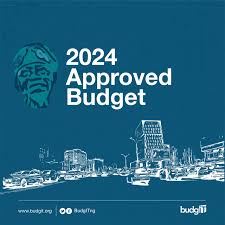The 2025 budget insertion has sparked controversy, with concerns about transparency and accountability. BudgIT, a civic tech organization, has published a report highlighting the need for reforms to ensure transparency and prudent management of public funds.
The 2025 Budget: A Closer Look
The 2025 budget, initially proposed at N49.74 trillion, underwent significant changes. The National Assembly increased the budget to N54.99 trillion, a cumulative increase of N5.29 trillion. Key changes include:
– Recurrent non-debt budget: Increased by N299.75 billion to N8.81 trillion.
– Recurrent debt budget: Cut by N2 trillion to N14.31 trillion.
– Capital expenditure budget: Increased by N9.11 trillion to N23.96 trillion, indicating new projects or boosted funding.
The National Assembly’s Budget Insertions
A staggering 11,122 projects worth N6.93 trillion were inserted into the 2025 budget by the National Assembly. This trend, accelerated in the 9th National Assembly, raises concerns about corruption and misallocation of resources. Some notable observations include:
– Large-value projects: 238 projects worth N2.29 trillion have values exceeding N5 billion.
– Projects by value range: 984 projects worth N1.71 trillion are valued between N1-5 billion, while 1,119 projects worth N641.38 billion are valued between the N500 million-N1 billion.
– Ministry-specific insertions: The Ministry of Agriculture received 4,371 projects worth N1.72 trillion, while the Ministry of Science and Technology received 1,777 new projects valued at N994.98 billion.
Concerns about Project Insertions
BudgIT’s analysis reveals that many inserted projects appear to serve narrow personal interests and political expediency rather than the broader public good. Some agencies and organizations, such as the Nigerian Building and Road Research Institute and Federal Co-operative College, have become targets for project insertions despite lacking the technical capacity to execute them.
Okocha Pius, Delta State Representative for BudgIT shares in a statement with THE POINTER NEWSPAPER their prosposal for better budget insertion and implementation.
“In this time when economic realities are worsening, especially as a result of inflation, Nigerians are looking up to the political elites to take actions that will improve our economic realities” he said.
He said “These budget insertions are alarming, unnecessary, and could reduce public confidence in the government. We need to prioritize transparency and accountability in our budget process to ensure that resources are allocated effectively and efficiently.”
Recommendations for Budget Reform
To address the issues with the budget process, BudgIT recommends the following:
- Assertive Executive Leadership: The President should initiate a reform-oriented dialogue with the National Assembly to establish a transparent and accountable process for constituency projects, aligning with national priorities.
- Judicial Clarification: A definitive judicial ruling is necessary to clarify the extent of the National Assembly’s appropriation powers, particularly regarding introducing new capital projects without executive involvement.
- Accountability and Enforcement: Public officials should be held accountable for corruption and mismanagement. The Economic and Financial Crimes Commission and the Independent Corrupt Practices Commission should prosecute cases of abuse and corruption.
- Citizen Engagement: Citizens and Civil Society Organizations should be included in the budget approval stage through “Citizens’ Budget Hearings.” This can prevent unnecessary insertions and ensure that the budget aligns with national priorities.
Pius concluded saying “ these recommendations offered by BudgIT’s publication are simply an overhaul of the current failing practice and these recommendations require a strong political will from the President, a justice system that is truly blind and impartial, and a deep sense of service from public office holders.
“By implementing these reforms, the government can build trust with citizens and ensure that resources are allocated effectively” he said.


